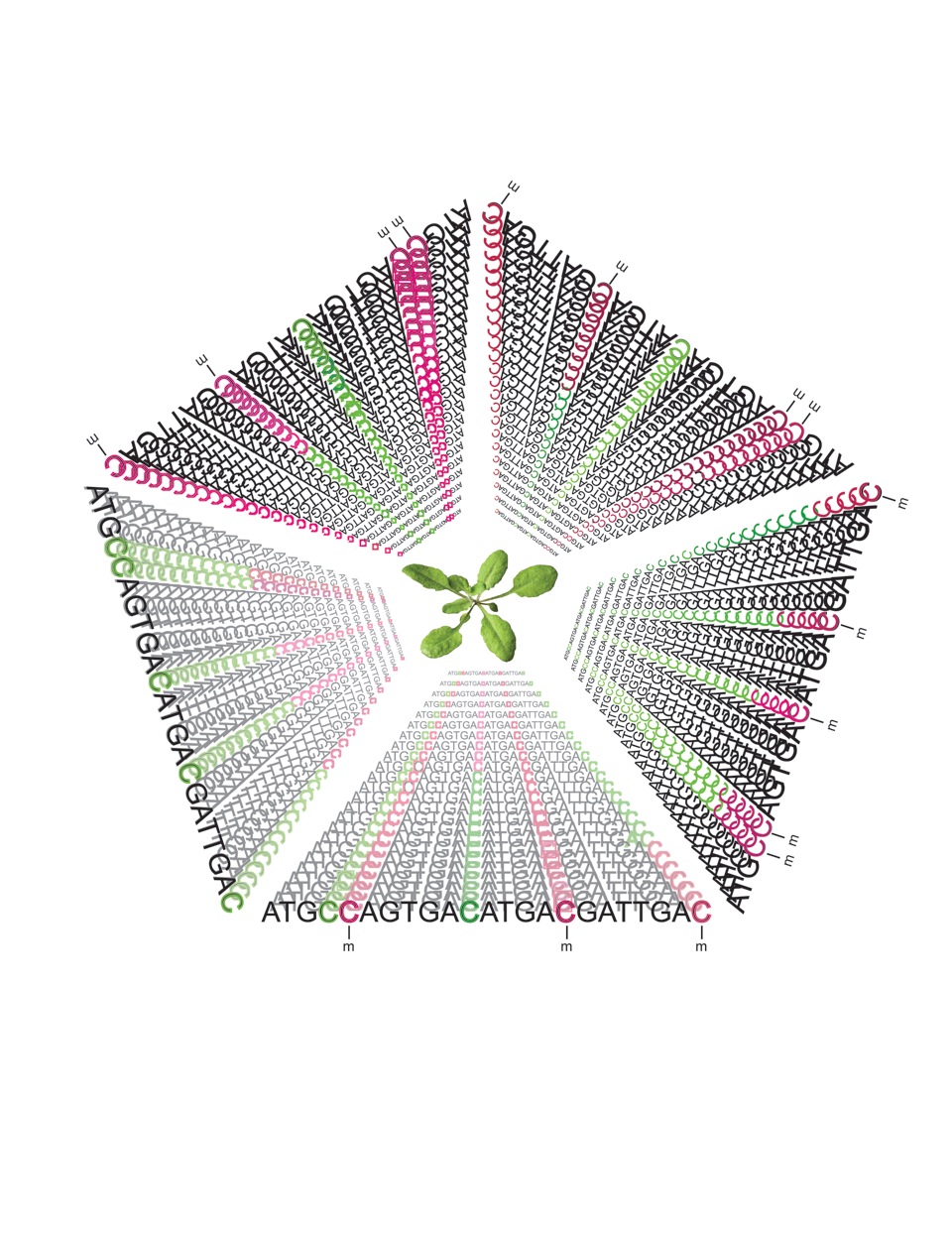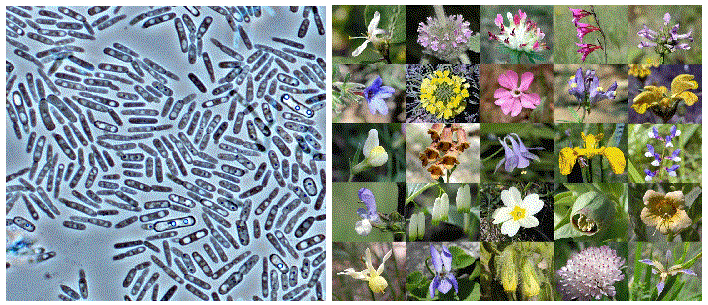SICB Annual Meeting 2013
January 3-7, 2013
San Francisco, CA
Symposium: Ecological Epigenetics
Symposium Overview
Phenotypic variation arises from interactions between environmental and genetic variation, and the emergence of such variation is, in part, mediated by epigenetic mechanisms: factors that modify gene expression but do not change the gene sequence, per se. Environmentally generated epigenetic variation has gained increasing attention over the last decade as a potentially important source of phenotypic variation in fueling evolutionary change. Yet, the role of epigenetic variation and inheritance (i.e., when epigenetic variants are passed between generations) in natural populations remains poorly understood. This may be due, in part, to the difficult nature of characterizing epigenetics in genetically heterogeneous populations experiencing variable environments. Further, while important advances have been made, independently, in disparate fields, the lack of dialogue and synergism among these fields has hampered a synthetic understanding of epigenetic variation in the real world. The budding field of Ecological Epigenetics seeks to extend our knowledge of epigenetic mechanisms and processes to natural populations, and recent conceptual and technical advances have made progress towards this goal more feasible. Given both the recent challenges and breakthroughs in Ecological Epigenetics, the overarching goal of our symposium is to bridge the diverse fields that inform and are informed by Ecological Epigenetics, and to promote transformative research in this field. To accomplish this, our symposium will make the following specific contributions: (i) identify the critical questions that can be answered by research in ecological epigenetics, (ii) feature effective empirical and theoretical approaches to studying epigenetics in the field (iii) bring together scientists who are established or emerging leaders in the diverse fields that comprise ecological epigenetics, and most importantly (iv) highlight scientists who have been most successful at merging the diverse fields that comprise ecological epigenetics.
Characterizing epigenetic variation in natural populations has the potential to enhance our understanding of ecological, evolutionary and developmental phenomena. In fact, it has been argued that advances made at the intersection of these fields will be the most critical advances in biology, given that most populations are currently undergoing profound and rapid environmental change. Integrating complementary fields has radically advanced our understanding of phenotypic diversity in the past: the integration of molecular developmental biology and evolutionary biology (the field of Evo-Devo) towards the late 20th century has shed tremendous light on how diverse organismal forms arise or are constrained over large time scales. Epigenetics mechanisms – by which environmental signals mediate differences in gene expression – have the power to describe the emergence and selection of phenotypic variation on ecological timescales, and the reciprocal contribution of such variation to ecological processes. Because the conceptual and technical advances necessary to characterize epigenetic variation and processes in nature have just begun to emerge, now is a particularly opportune time to develop a framework that will guide and facilitate exceptional studies in Ecological Epigenetics. Towards this goal, the Ecological Epigenetics symposium will bring together researchers with diverse strengths in theory, developmental genetics, ecology and evolution, as well as individuals at different stages of their academic career. 
Sponsors: DEDB, DCE, DEE
Organizers
Chairperson:
Cristina Ledón-Rettig, Department of Molecular Biomedical Sciences, North Carolina State University
Organizing Committee:
Andrea Liebl, Department of Integrative Biology, The University of South Florida
Armin Moczek, Department of Biology, Indiana University Bloomington
Christina Richards, Integrative Biology, The University of South Florida
Aaron Schrey, Armstrong Atlantic State University

Broad within-genotype niches achieved through phenotypic plasticity should evolve in regularly colonizing species with a metapopulation structure, and in those exploiting fine-grained habitats where environmental factors vary on spatial scales that are smaller than dispersal distances. Epigenetic changes that occur due to DNA methylation may contribute to population niche width by enhancing phenotypic plasticity, although this intriguing possibility remains essentially untested. In the nectar-living yeast Metschnikowia reukaufii (shown on left), changes in genome-wide DNA methylation patterns underlie the ability of this fugitive species to exploit a broad range of flowers exhibiting broad variation in sugar-related nectar features and extraordinary morphological and phylogenetic diversity, as illustrated by the sample of species in the photograph (shown on right). Environmentally induced DNA methylation polymorphisms allowed genotypes to grow successfully in extreme sugar environments, and the broad population niche width of M. reukaufii was largely made possible by epigenetic changes enabling genotype plasticity in resource use.
Speakers
S2-1.2 Friday, Jan. 4, 08:30 SCHREY, Aaron*; ALVAREZ, Mariano ; FOUST, Christy; KILVITIS, Holly; LIEBL, Andrea; MARTIN, Lynn B.; RICHARDS, Christina:
Ecological Epigenetics: Beyond MS-AFLP
S2-1.3 Friday, Jan. 4, 09:00 DAY, Troy:
Evolutionary consequences of nongenetic inheritance
S2-1.4 Friday, Jan. 4, 09:30 RICHARDS, Eric J*; HENKHAUS, Natalie; ANAND, Ila S.:
Natural Epigenetic Variation in Arabidopsis
S2-1.5 Friday, Jan. 4, 10:30 HERB, Brian R.; WOLSCHIN, Florian; HANSEN , Kasper D.; ARYEE, Martin J.; LANGMEAD, Ben; IRIZARRY, Rafael; AMDAM, Gro V.*:
Reversible switching between epigenetic states in honeybee behavioral subcastes
S2-1.6 Friday, Jan. 4, 11:00 GLASTAD, K M; HUNT, B G; YI, S V; GOODISMAN, M A D*:
The function of DNA methylation in insects
S2-1.7 Friday, Jan. 4, 11:30 SNELL-ROOD, EC:
The role of learning in mediating transgenerational responses to nutrition
S2-2.1 Friday, Jan. 4, 13:00 RICHARDS, CL*; BORUTA, Martyna; BOSSDORF, Oliver; COON, Courtney AC; FOUST, Christy M; HUGHES, A Randall; KILVITIS, Holly J; PIGLIUCCI, Massimo; NICOTRA, Adrienne B; PIGLIUCCI, Massimo; ROBERTSON, Marta H; SCHREY, Aaron W:
Epigenetic mechanisms of phenotypic plasticity
S2-2.2 Friday, Jan. 4, 13:30 ECKER, Joseph:
Personal and Population Level Epigenome Dynamics
S2-2.3 Friday, Jan. 4, 14:00 LIEBL, AL*; SCHREY, AW; RICHARDS, CR; MARTIN, LB:
Epigenetic variation: a mechanism to overcome reduced diversity in novel environments?

